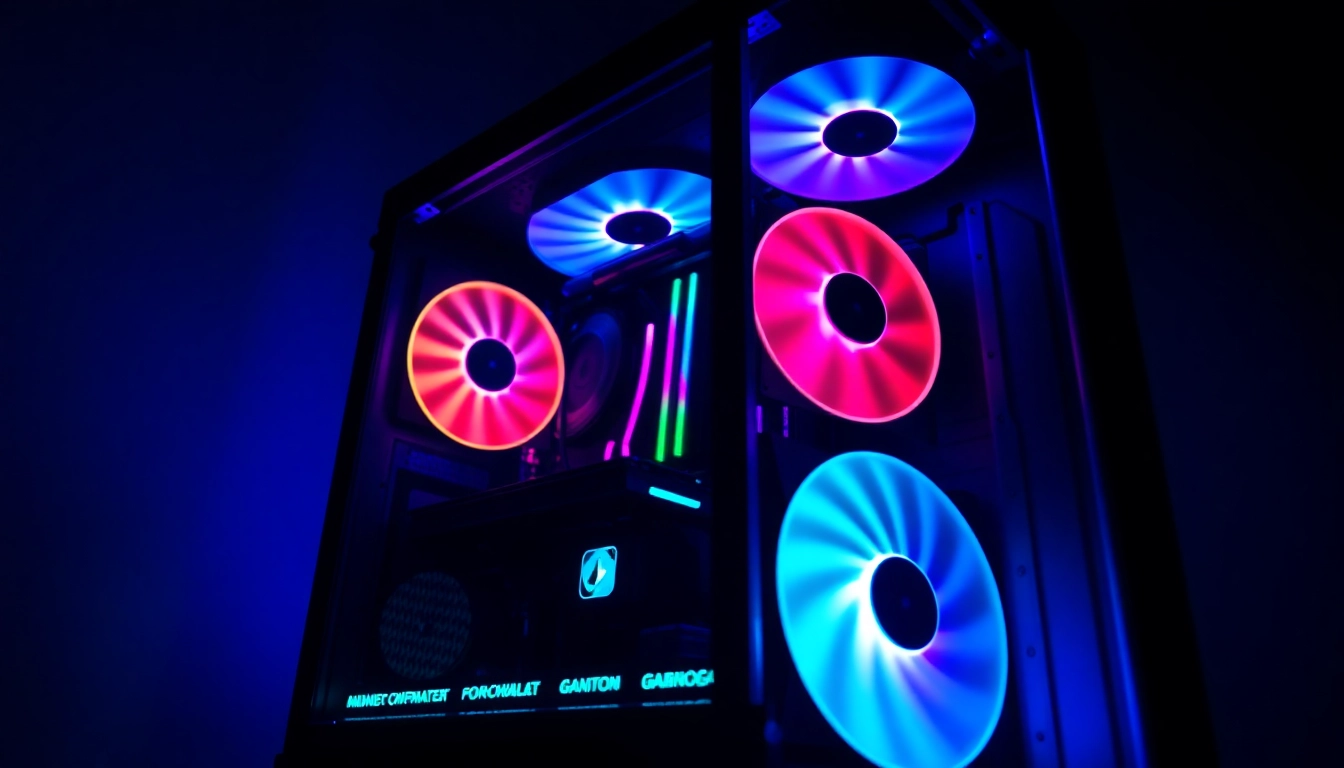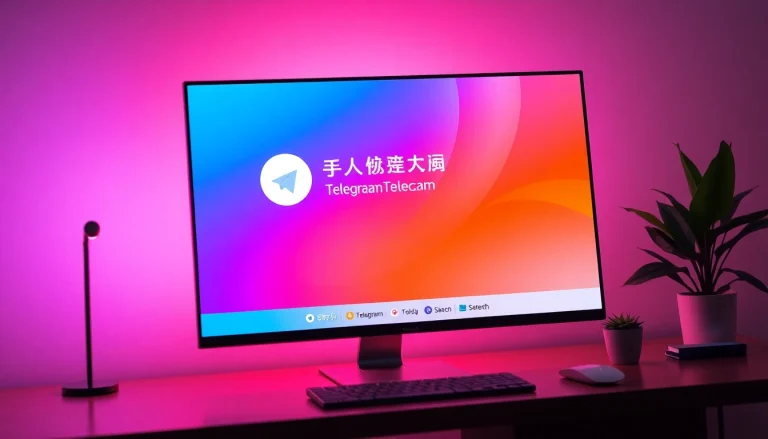Understanding Gaming PC Cases
The gaming pc case is an essential component in any gaming PC build, encapsulating not just the hardware but also the style and personality of the user. It serves as the foundation for your entire gaming rig, affecting everything from airflow and cooling solutions to aesthetic appeal and upgradeability. In this comprehensive guide, we will explore the nuances of gaming PC cases, helping you understand their importance, key features, types, and how to make the right choice for your personal setup.
What Makes a Gaming PC Case Different?
Gaming PC cases are specifically designed to accommodate high-performance components typical of gaming systems such as powerful GPUs, multiple hard drives, and additional cooling systems. Unlike standard cases, gaming cases often include premium materials and features that enhance not only utility but also visual appeal. They may offer:
- Optimal Airflow: Designed with multiple fan placements and ventilation options to cool high-performance components.
- Robust Build Quality: Constructed from durable materials like tempered glass or aluminum.
- Customizable Aesthetics: Integrated RGB lighting, tinted panels, and themed designs suited for gamers.
Key Features to Look For
When selecting a gaming PC case, it’s crucial to consider several key features:
- Size and Compatibility: Ensure compatibility with ATX, micro-ATX, or mini-ITX motherboards. Also, consider GPU length and CPU cooler height for future upgrades.
- Cooling Options: Look for cases that accommodate multiple fans and radiators, alongside support for liquid cooling systems.
- Port Availability: USB Type-C ports and sufficient I/O options for modern connectivity needs.
- Cable Management: Features like cable routing channels, Velcro straps, and shrouded PSU compartments contribute to a clean build.
Types of Gaming PC Cases Explained
Gaming PC cases come in various forms, each catering to different needs and preferences. Here’s a breakdown of popular types:
- Full Towers: These cases offer extensive space for custom water cooling setups, large motherboards, and ample storage options. Ideal for those seeking maximum flexibility.
- Mid Towers: A balanced option that usually supports standard ATX motherboards and provides sufficient cooling and expansion capabilities.
- Mini Towers: Compact designs that prioritize space-saving without sacrificing essential features. Suitable for smaller systems or on-the-go setups.
- Micro and Mini-ITX Cases: Purpose-built for small-form-factor (SFF) builds, focusing on portability while maintaining key gaming functionalities.
Top Gaming PC Case Brands to Consider
Leading Brands in the Market
While many brands offer gaming PC cases, a few names consistently rise to the top based on performance, aesthetic variety, and customer satisfaction:
- Corsair: Known for stylish and functional designs, Corsair cases often feature excellent cooling solutions and RGB lighting.
- NZXT: Specializes in modern aesthetics and user-friendly assembly ease, frequently incorporating innovative cooling solutions.
- Thermaltake: Offers a wide range of customizable options, including cases with integrated RGB and water cooling possibilities.
- Lian Li: Renowned for high-quality aluminum cases that prioritize durability and premium aesthetics.
Comparative Overview of Features
A comparative analysis reveals how different brands focus on unique features. For example:
| Brand | Key Features | Popular Models |
|---|---|---|
| Corsair | Flexible cooling, RGB compatibility | iCUE 4000X, 5000D Airflow |
| NZXT | User-friendly installation, cable management | H510, H510 Elite |
| Thermaltake | Modularity, RGB features | View 71 Tempered Glass, H Series |
| Lian Li | Silent operation, high airflow | O11 Dynamic, LANCOOL II |
Customer Reviews and Ratings
Consumer feedback can greatly influence purchasing decisions. A look into reviews shows:
- Corsair cases consistently receive praise for their build quality and airflow efficiency.
- NZXT products are regarded for aesthetics, though some users mention a learning curve in cable management.
- Thermaltake cases often get high marks for their customizable features, although users note that fans can be noisy under load.
- Lian Li is often commended for its premium construction and understated elegance, but the price point may deter some budget-conscious buyers.
How to Choose the Right Gaming PC Case
Assessing Your Build Requirements
Before making a decision, it’s vital to assess your specific requirements:
- Component Selection: The case must accommodate all components, including the motherboard, GPU, power supply, and cooling systems. Verify dimensions and support specs for your components.
- Future-proofing: Consider potential upgrades — the case should allow for additional components like extra hard drives or larger GPUs.
- Heat Generation: High-end components generate more heat, necessitating effective cooling solutions. Choose a case that provides flexibility for multiple fans or liquid cooling solutions.
Importance of Cooling Solutions
Cooling is a primary concern for gamers as it affects the overall performance and longevity of gaming hardware:
- Airflow Design: Look for cases with optimal airflow paths. An efficient layout includes intake and exhaust fans, along with minimized obstruction of airflow.
- Cooling System Compatibility: Ensure that the case accommodates preferred cooling solutions—either air or liquid. Cases designed for liquid cooling include mounting points for radiators.
- Noise Considerations: Consider fan noise levels, especially if the case tends to run hot. Some cases come with noise-dampening materials that help reduce acoustic levels.
Budget Considerations and Value
Finding the right gaming PC case often involves a careful balance of features and price. Budget considerations should take into account:
- Price Range: Gaming PC cases can range from under $50 for basic models to over $200 for premium cases. It’s essential to match your budget with your needs.
- Value for Money: Consider what features you deem essential. A more expensive case may offer long-term benefits through better cooling and improved aesthetics.
- Warranty and Support: Reliable brands often provide better support and warranties, which can enhance the value proposition of a more expensive product.
Customizing Your Gaming PC Case
Popular Modifications and Personalization
Customization is a vital aspect of gaming PC culture that allows users to showcase their unique styles. Common modifications include:
- Painting and Theming: Users often paint cases or apply vinyl skins to match their gaming setups.
- Lighting Upgrades: Integrating LED strips for additional colors and effects can significantly change the overall aesthetic.
- Window Panels: Upgrading to tempered glass panels provides an opportunity to display internal components attractively.
Essential Accessories for Enhanced Functionality
Several accessories can enhance the functionality and look of your gaming PC case:
- Aftermarket Fans: Upgrading fans can significantly improve cooling efficiency while reducing noise. Look for RGB models that fit your aesthetic.
- Fan Controllers: These help manage fan speeds based on temperature, providing a balance between cooling performance and noise levels.
- Cable Extensions: Colorful cable extensions can streamline your cables, improving organization and aesthetics.
Showcasing Your Unique Style
Custom builds become a reflection of the owner’s personality. Showcase your unique style through:
- Using Unique Parts: Select components that resonate with personal taste. Think of themed builds around favorite games or franchises.
- Effective Layouts: Organizing components cleanly, routing cables effectively, and choosing a stunning color scheme can make your rig stand out.
- Involving the Community: Participate in forums or social media groups to share your build and gain inspiration from others.
Future Trends in Gaming PC Cases
Emerging Technologies in Case Design
The landscape of gaming PC cases is evolving with technology. Trends shaping the future include:
- Smart Cases: Cases equipped with smart features, such as app-controlled RGB lighting and fan speed adjustments.
- Modularity: Designs allowing easy upgrades and interchangeable components, accommodating various form factors.
- Integrated Cable Management: Advanced designs that naturally conceal cables, leading to cleaner setups.
Sustainability and Eco-Friendly Materials
As awareness of environmental issues increases, there’s a strong trend towards:
- Using Recycled Materials: Brands beginning to incorporate recycled aluminum and plastics into case designs.
- Sustainable Practices: Companies adopting sustainable manufacturing practices, reducing waste and carbon footprints.
- Durable Design: Emphasis on long-lasting designs to promote longevity over disposable products.
Predictions for Aesthetic and Functional Developments
The future will likely bring exciting changes in both aesthetics and functionality. Expect to see:
- Striking Aesthetics: Continued growth in customizable RGB lighting and sleek, modern designs that appeal to gamers.
- Thermal Solutions: Enhanced cooling technologies such as embedded liquid cooling systems and more effective airflow designs.
- Increased Focus on User Experience: Better integration of features that simplify assembly and future upgrades, catering to both novice builders and experienced practitioners.








